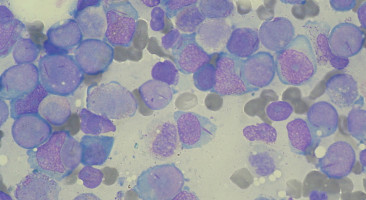
Acute myeloid leukaemia (AML) is primarily a disease of older adults.
Standard commonly utilised lower-intensity therapies, such as azacitidine or decitabine, provide only limited responses with expected median survival of 9-10 months and complete remission (CR) / CR with incomplete count recovery (CRi) rates <40%.
We evaluated the efficacy of a combination regimen of azacitidine and venetoclax in treatment-naïve AML patients that were ineligible for intensive therapy.
In a Phase III randomised double-blinded multi-centre trial called “VIALE-A”, the efficacy of the combination regimen was compared to treatment with azacytidine plus a placebo.
In 431 internationally enrolled patients in the VIALE-A trial, the combination of azacitidine and venetoclax led to improved overall survival (14.7 vs 9.6 months), and improved response rates CR/CRi (66% vs 28%), compared to azacitidine alone.
In addition, the combination was associated with responses that occurred more quickly (median time to CR/CRi was only 1.3 months) and were more durable (lasting 1.5 years), and with increased incidence of transfusion independence (58% vs 34%).
In conclusion, this practice-changing multi-centre randomised Phase III trial establishes venetoclax and azacitidine as a new standard of care for older patients with AML.
Source: EHA
Watch our interview with Dr Courtney DiNardo on the VIALE-A study here.
We are an independent charity and are not backed by a large company or society. We raise every penny ourselves to improve the standards of cancer care through education. You can help us continue our work to address inequalities in cancer care by making a donation.
Any donation, however small, contributes directly towards the costs of creating and sharing free oncology education.
Together we can get better outcomes for patients by tackling global inequalities in access to the results of cancer research.
Thank you for your support.